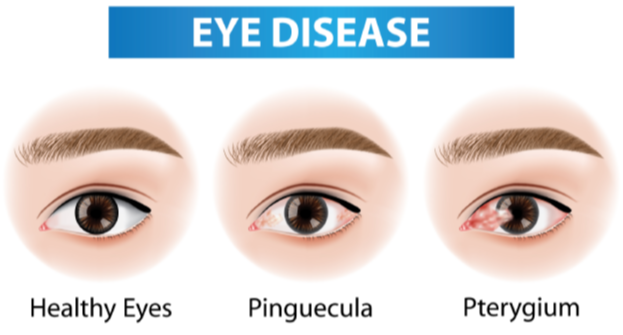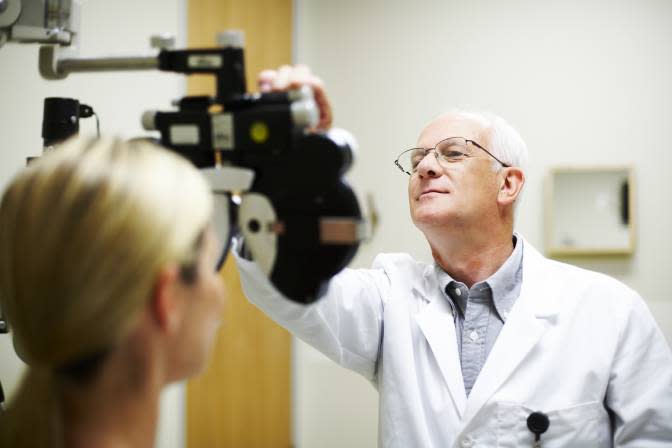Buy One, Get One 50% OFF Eyeglasses
* Restrictions apply. Ask a Team Member for details.
Pterygium Treatment and Management

Find Relief at Clarkson Eyecare
Pterygium is a noncancerous eye condition that affects more than three million people in the United States each year.
Pterygium is often called “Surfer’s Eye” because it is linked mainly to ultraviolet exposure and is most often diagnosed in people who spend time outdoors. It occurs when a growth of tissue forms on the outer layer of your eye. While it is not severe, a pterygium can cause discomfort and impact your vision.
The experts at Clarkson Eyecare have decades of experience diagnosing and treating conditions like Pterygium. With the most advanced technology available, our doctors can determine the severity of the condition and provide the best treatment plan for you.
Book an appointment at any of our locations in Florida, Georgia, Illinois, Kentucky, Michigan, Minnesota, Missouri, New Jersey, Ohio, and Virginia.
Symptoms of Pterygium
Most people can see or feel pterygium. It generally appears on the part of your eye closest to your nose. Symptoms include redness, itchiness, irritation, a burning sensation, and a feeling like you have something in your eye. A thick or large growth can cover your cornea, which can cause impaired or loss of vision.
Most pterygiums can be treated using artificial tears (eye drops) or ointments with corticosteroids. At Clarkson Eyecare, our doctors perform comprehensive eye exams using the latest technology available to identify and diagnose various eye conditions like pterygium. We can help you determine whether eye drops, ointment, or outpatient surgery is the best treatment for your unique eyes.
A pterygium is a common eye condition that affects millions of people of all ages. Males are twice as likely to be diagnosed with a pterygium than females. While sun exposure and UV light are the main causes, there are other risk factors including dry eyes and exposure to environmental irritants like pollen, dust, sand, smoke, and wind.
The people who are the most at risk for pterygiums are:
People who spend a lot of time outdoors, especially without wearing sunglasses or eye protection
People who live in warmer climates, on the coast, or close to the equator
People who suffer from dry eyes
Non-Surgical Treatments for Pterygia
Pterygium doesn’t always require treatment. However, you may want to explore options with an optometrist if it is blocking vision or causing severe discomfort. Most pterygiums can be treated using artificial tears (eye drops) or ointments with corticosteroids. These reduce inflammation and alleviate discomfort. If your pterygium doesn’t continue to grow, this may be all that’s required to manage your condition successfully.
Surgical Treatments for Pterygia
Pterygia usually only becomes a problem when they continue to grow so much that they begin growing over the cornea, the clear front part of your pupil that lets light into your eye. When this happens, you might start to notice issues with your vision.
Sometimes, patients won’t have vision issues but don’t like how the pterygium looks and want it removed for cosmetic reasons. In both cases, outpatient surgery to remove the pterygium is a treatment option. In either case, the eye experts at Clarkson Eyecare can use comprehensive eye exams to help determine the best course of treatment for you. Speak with your Clarkson Eyecare doctor today to discuss how to manage your pterygium.

Explore Pterygium Treatment Options at Clarkson Eyecare
Pterygium is a common eye condition that can affect all members of your family. At Clarkson Eyecare, we provide expert, compassionate eye care and treat eye conditions for patients of all ages. If you believe you or your loved one may have pterygium, schedule an eye exam today!
Can Pterygium Be Treated Without Surgery?
Most pterygiums can be treated using artificial tears, steroid eye drops, or ointments with corticosteroids. Your doctor may recommend pterygium surgery, a painless outpatient procedure if the growth causes extreme discomfort or begins to impact your vision significantly.
Pterygium surgery is minimally invasive and generally takes no more than 30 minutes. Amniotic membrane transplantation may be recommended to have your pterygium surgically removed. We will work with you to determine the best surgical treatment option.
Can a Pterygium Go Away On its Own?
While a pterygium may stop growing or clear up independently, treatment is often necessary. If you see or feel a growth on your eye or experience redness, itchiness, or loss of vision, call us to schedule an appointment with Clarkson Eyecare today.
Is a Pterygium Cancerous?
A pterygium is not cancerous and can be treated through medication or surgery. At Clarkson Eyecare, we recommend routine eye exams to your doctor to monitor the healing process and prevent future growths from occurring.
Get Your Pterygium Treated at Clarkson Eyecare
At Clarkson Eyecare, we aim to provide every patient with the best vision possible. If you have a pterygium, schedule an appointment with our eye doctors to discuss your treatment options.